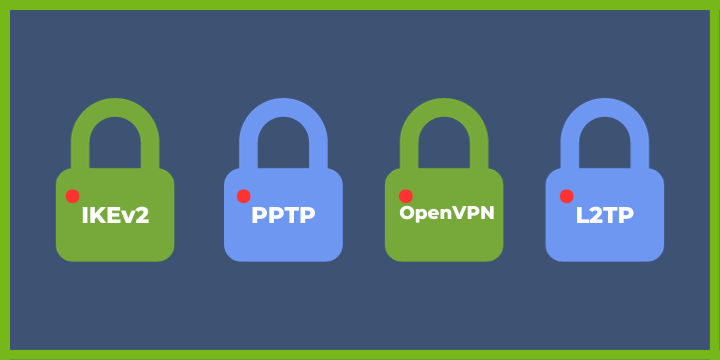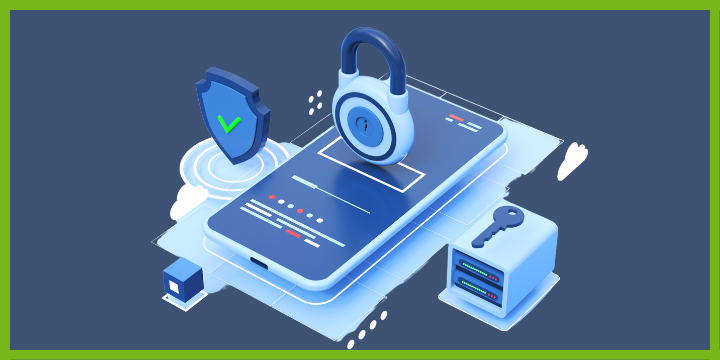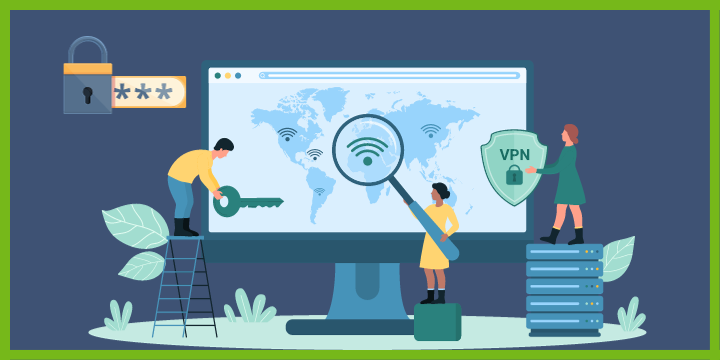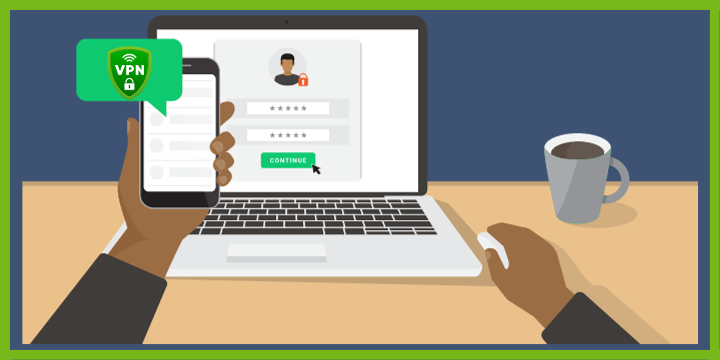To better understand what VPN protocols are, it is best to first understand what a VPN is. A VPN (Virtual Private Network) is a technology that allows us to layer incoming and outgoing traffic amongst multiple networks, thus, covering your legitimate online footprints. VPN protocols are necessary to securely surf the web, especially when connecting to unsecured third-party wifi hotspots in any public place. When using a VPN all of your data is encrypted, thus making sure no outbound or inbound traffic from your device can be compromised. This way your data is under secure lockdown that gives close to 0 chances for any harmful third parties to get their hands on your data.

What Is A VPN Protocol
VPN network protocols are a comprehensive service that provides a secure connection between two or more devices. It is a set of standards for encoding information from the users’ digital devices to the web servers and back. VPN protocols have different characteristics which helps them be effective no matter the cyber conditions. For example, the IKEv2 is ideal for stationary tech, while other protocols are more suitable for portable devices. For an ordinary web user to better understand what a VPN protocol is, he/she must understand what value exactly a VPN protocol provides. To put it simply, a VPN protocol is the technology behind Virtual Private Networks that decides what route is most secure for your incoming and outbound traffic, depending on your location and device. And just to make sure that you are secure when browsing the web to the highest of your VPN capabilities, make sure you use the right type of VPN tools. If you are browsing the web via a PC or laptop, use the VPNs plugin for your browser. If you are browsing the web via your smartphone, make sure you use the VPNs app for either iOS or Android.
What Is VPN Encryption
VPN encryption is a sort of technology that encrypts data that would otherwise be open to the public, converting it from a readable and easy-to-access format into an encrypted code. Encryption makes your inbound and outbound data inaccessible to any harmful third parties online, and the only way to decrypt your data would be to use the appropriate key. Thanks to data encryption, the online information of users send and receive is protected from any third parties, even their internet providers. Overall, it is important to use VPN encryption whenever you are using the web when connected to unsecured public wifi. That is when you and your data are most vulnerable.
If you are browsing the web without a VPN and are connected to a compromised public wifi hotspot, harmful third parties will be able to pinpoint your exact location and even obtain your personal information. This doesn’t just threaten your data but also gives harmful malicious software the chance to compromise your computer.

What Protocols Are Used By Planet VPN
Planet VPN is a reliable VPN provider and offers its users the chance to safely and securely browse the web without any limitations, both geographical and speed-wise. With Planet VPN you can even bypass any limitations that were made by an Internet provider, thus allowing you to browse any online content you would want without limitations.
Planet VPN Includes:
- Point-to-Point Tunneling Protocol (PPTP)– a so-called point-to-point VPN tunneling protocol, through which a PC establishes a secure connection to the server.
- Layer 2 Tunneling Protocol через Internet Protocol Security (L2TP/IPSec) – a second-level tunneling protocol, with encapsulation, which allows applications to interact for a long time.
- OpenVPN– is a VPN protocol that provides secure communication between network users.
- Internet Key Exchange v2 (IKEv2)is a VPN protocol that provides secure communication between network users.
![]()
Recommendations On How To Use VPN Protocols
Each VPN protocol contains individual algorithms for encoding information. In return, this affects the speed of processing requests and ensures the level of security in the network. Depending on the online needs of the user, you can indicate which VPN Protocol is needed.
Here is a short overview of two types of VPN Protocols
- PPTP
PPTP protocol is the most popular among Internet users. A client can use the PPTP protocol to send data from a PC or any mobile device through a VPN tunnel. Devices are automatically authenticated with a password.
Advantages: PPTP is convenient for the user, as there is no need to purchase additional equipment to form a secret key. It is a simple protocol that ensures stable operations in the online environment. It is easy to install even for non-professional users.
Disadvantages: A protocol with weak encryption, and weak protection of the transmitted key. Not recommended for sharing confidential information.

- L2TP/IPSec
L2TP/IPSec is very similar to the RTR protocol. However, the main distinctive feature is that L2TP/IPSec ensures data privacy. Dual encapsulation is used: L2TP itself, which does not provide encryption, is used for data transfer, and tunneling is provided by IPSec protocols, thus the name, L2TP/IPSec
Advantages: the user can configure the L2TP/IPSec protocol on mobile and stationary devices with iOS, Windows, Linux, and Android software. Protocol support is built into all operating systems.
Disadvantages: because the L2TP/IPSec protocol contains additional security options, using encapsulation, the speed of the network connection is reduced.
- OpenVPN
OpenVPN protocol creates an encrypted connection to the global web. This is not a pure protocol, but a complete open source VPN protocol solution that can quickly transfer data and authenticate your device.UDP and TCP transfer protocols are used to exchange encrypted information. Their use is determined by the result: reliable secure connection or high speeds? Using UDP implies fast data exchange, where the verification of an array of transmitted data packets, or rather, the comparison of the number of transmitted and received packets, occurs at the last stage. This is an optimal solution when working with fast Internet connections. TCP connection implies the instant confirmation of the receipt of each sent packet. To increase reliability, this protocol is used in case of possible traffic blockages, as well as in case of an unstable connection.
Advantages: open code, allowing the use of non-standard transmission and encryption settings, which makes it impossible to decrypt the encryption even for special services. OpenVPN provides an efficient performance and a higher level of security. According to experts, it is the best solution for creating a private virtual network today.
Disadvantages: OpenVPN installation is a bit more complicated, which is the case with other protocols. There is no built-in support operating systems, and third-party software is required to use it.
- IKEv2
IKEv2 protocol is a modern VPN protocol from Cisco and Microsoft. It allows the creation of direct tunnels with classified IPs between the client and server. In the IKEv2 protocol, you can flexibly use cryptographic algorithms. The user chooses the most convenient way to encrypt data. IKEv2 also provides reliable protection against DoS attacks, which is an undeniable advantage for owners of web resources. In addition, IKEv2 is suitable for installation on various devices, including routers.
Advantages: It is considered to be the fastest data transfer protocol because it works on the OS kernel level. It is optimized for systems with relatively low performance and low-powered computers and mobile devices.
Disadvantages: not all operating systems are supported.

Comparing Common VPN Protocols: Which One Is Right for You?
Comparing common VPN protocols is essential to determine which one suits your needs best, as each offers unique features and levels of security:
- L2TP/IPsec: Known for its simplicity, Layer 2 Tunneling Protocol (L2TP) with IPsec is a good choice for users seeking ease of use. It provides strong encryption but might be less secure than OpenVPN.
- IKEv2/IPsec: This protocol is known for its speed and reliability, making it ideal for mobile devices. It can quickly reconnect to a server after a network switch, ensuring a consistent connection.
- SSTP: Developed by Microsoft, Secure Socket Tunneling Protocol (SSTP) is an excellent choice for Windows users. It’s highly secure, as it uses SSL/TLS encryption, but it may have limited availability on non-Windows platforms.
- PPTP: While fast, Point-to-Point Tunneling Protocol (PPTP) is considered less secure due to vulnerabilities. It’s suitable for users who prioritize speed over security but should be avoided for sensitive activities.
- WireGuard: A newer protocol gaining popularity for its speed and security. WireGuard offers strong encryption and is known for its efficiency.
- IKEv1: An older version of IKE, IKEv1 is less secure than its successor (IKEv2) but may still be supported by some VPN services.
The right VPN protocol depends on your priorities, such as security, speed, device compatibility, and ease of use. It’s advisable to choose a VPN service that offers multiple protocol options, allowing you to switch based on your specific requirements. Always pair your choice with a trustworthy VPN provider and maintain a secure online experience.







